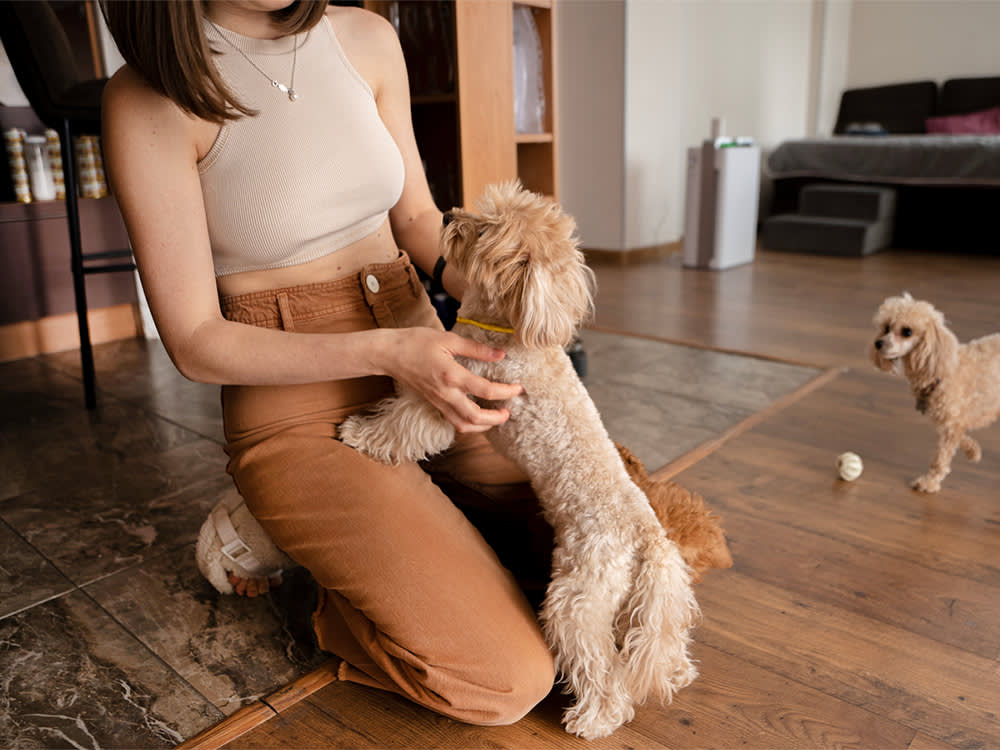Trust: A Complex Human Emotion — Why Do We Often Trust Dogs More Than People?
Trust: A Complex Human Emotion — Why Do We Often Trust Dogs More Than People?
Trust is one of the most fundamental and yet fragile emotions in human experience. It shapes our relationships, influences our decisions, and builds the framework for community and connection. Yet, paradoxically, trust can be elusive and difficult to sustain, especially in human interactions. The image you shared humorously and poignantly highlights a truth felt by many: a person’s trust in other people can sometimes feel limited—only around 30%—while their trust in dogs can be absolute and unwavering, reaching 100%.
This contrast may seem amusing on the surface, but it opens a window into deeper truths about the nature of trust, the reliability of relationships, and what it means to be truly loyal. Why is it that dogs, creatures we share our lives with, seem to earn our complete trust so effortlessly, while humans—our own species—often struggle to achieve that same level of faith? In this essay, we will explore the psychology of trust, the unique qualities of dogs that inspire such loyalty, and what this means for how we understand and navigate human relationships.
Trust, in its essence, is the belief or confidence that someone or something will act in our best interest or at least behave predictably and consistently. It involves vulnerability because to trust someone means to accept some level of risk—that they might let us down, hurt us, or break promises. For this reason, trust is built slowly over time through repeated positive experiences and can be broken instantly by betrayal.
Humans are inherently social creatures, dependent on each other for survival, companionship, and support. Trust is therefore foundational to cooperation and community. But human trust is complicated by a variety of factors: cultural differences, personal experiences, emotional baggage, and even evolutionary instincts. Trusting another person is not just about their actions; it is also influenced by our perceptions, fears, and previous hurts.
The statistic “My trust in people 30%” captures this struggle well. Many people have learned, through experience, that others can be unreliable, self-serving, or hurtful. Disappointments, betrayals, and misunderstandings accumulate and chip away at our willingness to trust fully. This cautious approach is a natural defense mechanism—a way to protect oneself from emotional pain and disappointment.
In stark contrast to the 30% trust in people, the “100% trust in dogs” resonates deeply with many dog owners and animal lovers. Dogs have earned the title “man’s best friend” for centuries, and their reputation for loyalty and unconditional love is well-deserved.

What makes dogs so trustworthy in human eyes? Several key qualities contribute:
-
Consistency: Dogs are remarkably consistent in their behavior. They offer affection, companionship, and protection day after day without hidden agendas or mood swings. This predictability builds a strong foundation for trust.
-
Unconditional Love: Unlike humans, dogs do not judge or hold grudges. Their affection is unconditional. They do not care about social status, wealth, or flaws. This pure acceptance is rare and deeply comforting.
-
Nonverbal Communication: Dogs express their feelings and intentions clearly through body language, which can be easier to interpret than the complex verbal and nonverbal signals humans send. This clarity reduces misunderstandings.
-
Protective Instinct: Many dogs have a natural protective instinct towards their owners. They sense danger and act without hesitation to defend their family, reinforcing the perception of loyalty and dependability.
-
Empathy and Emotional Support: Dogs are attuned to human emotions and often respond to sadness or stress with comforting behaviors. This empathetic response strengthens the bond of trust.
For these reasons, dogs often become trusted companions who offer a safe harbor in a world where human relationships can be complicated and fraught with risk.
Why do so many people struggle to fully trust other humans? One major reason is the frequency of disappointment. From childhood, people experience betrayals—whether through broken promises, gossip, neglect, or outright betrayal. These experiences shape expectations and foster a sense of caution.

In addition, societal pressures and cultural shifts sometimes undermine trust. In fast-paced, competitive environments, people may prioritize personal gain over relationships, fostering cynicism and mistrust. Social media and news cycles amplify stories of deceit, corruption, and broken bonds, reinforcing negative views of human reliability.
Psychologists suggest that broken trust can have deep emotional consequences, impacting mental health and social well-being. It creates barriers to intimacy and cooperation and can lead to isolation. Thus, the instinct to limit trust—to give it only sparingly—is a form of emotional self-preservation.
Given these challenges, dogs offer a unique remedy. Their presence is healing. Therapy dogs and emotional support animals have been shown to reduce stress, anxiety, and depression, helping people rebuild their capacity for trust and connection.

Many dog owners speak of their pets as their most trusted confidants, feeling understood and accepted without fear of judgment. Dogs provide a non-threatening source of companionship, which helps repair the emotional wounds left by human relationships.
Moreover, caring for a dog also teaches responsibility, patience, and empathy, qualities that can translate into improved human interactions over time.
What can the way we trust dogs teach us about how to build better trust with people?
-
Consistency Matters: Just as dogs build trust through consistent behavior, humans too can foster trust by being reliable and predictable.
-
Unconditional Acceptance: While it is challenging, striving to accept others with their flaws can deepen bonds.
-
Clear Communication: Avoiding ambiguity and being honest helps reduce misunderstandings.
-
Empathy and Support: Showing genuine care and emotional presence nurtures trust.
-
Forgiveness: Like dogs who don’t hold grudges, learning to forgive helps rebuild trust after mistakes.
While it is heartwarming to trust dogs fully, it is important to recognize that trust in humans must be balanced with caution. Blind trust can lead to harm. Healthy boundaries are necessary to protect oneself while allowing for meaningful relationships.
Trust is not an all-or-nothing state but a continuum, built and rebuilt through experience. Sometimes, trusting cautiously and gradually is the wisest path.

Ultimately, dogs embody qualities that humans often aspire to but sometimes struggle to practice consistently. Their innocence, loyalty, and unwavering love offer a glimpse of an ideal relationship—one without deception, judgment, or selfishness.
For many, trusting dogs at 100% is not just about the animals themselves, but also a statement about the hope for simpler, more genuine connections. It is a reminder of what trust can be when it is free from fear and full of love.

The contrast between “My trust in people 30%” and “My trust in dogs 100%” is more than just a humorous meme. It reflects deep truths about human nature, relationships, and emotional survival. While humans can be complex and sometimes disappointing, dogs offer a model of loyalty and unconditional love that inspires us to be better, to trust more wisely, and to cherish connections built on genuine care.
In a world where trust is often fragile and scarce, dogs remind us of the power of consistent kindness and faithfulness. And perhaps, by learning from our canine companions, we can rebuild and strengthen the trust that forms the foundation of our human communities.
